Avoid getting scammed by emails giving away a Yamaha baby grand piano
Phishing/ScamAlso Known As: "Yamaha Baby Grand Piano" spam email
Get free scan and check if your device is infected.
Remove it nowTo use full-featured product, you have to purchase a license for Combo Cleaner. Seven days free trial available. Combo Cleaner is owned and operated by RCS LT, the parent company of PCRisk.com.
What kind of email is "Yamaha Baby Grand Piano"?
"Yamaha Baby Grand Piano" is an email spam campaign. There are multiple variants of these emails, but the common throughline is the donation of a Yamaha baby grand piano. When a recipient expresses interest in obtaining the piano for free, they are requested to pay the shipping fees – thus, they are tricked into transferring money to scammers.
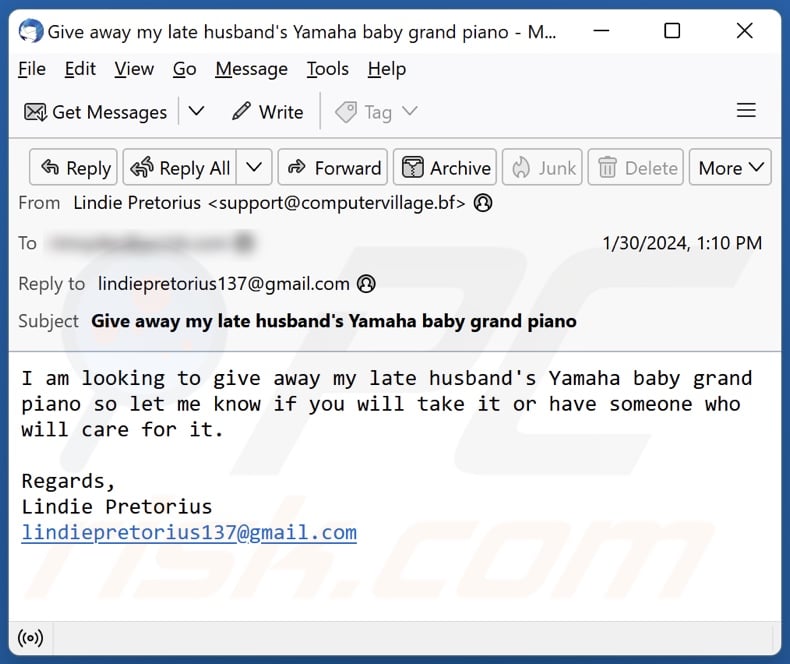
"Yamaha Baby Grand Piano" email scam overview
We have found five versions of the "Yamaha Baby Grand Piano" email with the following subjects – "Give away my late husband's Yamaha baby grand piano", "Giving Out Yamaha Baby Grand.", "For Instrument Lover.", "Donating my Yamaha Baby Grand Piano GCI model to you", and "GRAND PIANO". However, it must be mentioned that other subject lines and text contents of the letters are highly likely.
The connecting theme of these emails is that the sender is giving away their Yamaha baby grand piano for free. It is common for the messages to state that the nonexistent instrument had belonged to a deceased spouse of the sender, but other familial connections (or none) may be indicated in these letters.
Typically, recipients are lured into conversing with the scammer over subsequent emails. During this, more details can be added to the bogus story – i.e., the cyber criminals may provide photos of the fake piano and expand upon its history (e.g., origins, late owner, previous sale or giveaway attempts, etc.).
Recipients interested in the musical instrument are only asked to cover the shipping/moving fees. This lure may be incredibly successful, as grand pianos (even used) in cost can range from four to five digits in USD.
Scammers can leverage the names of legitimate shipping companies or other entities to heighten the impression of legitimacy. Victims can be redirected to arrange the shipping with a supposed delivery agent, and this conversation may take place on a webpage mimicking the site of a genuine company.
Once the arrangements to ship the imaginary instrument are made, victims are asked to pay the delivery fees (which can range from three to four digits in USD). Cyber criminals can rely on legitimate platforms for monetary transactions or use more questionable means to acquire the funds.
It is noteworthy that scammers might not seek money directly but instead target victims' personally identifiable or finance-related information (e.g., ID card details, banking account data, credit card numbers, etc.). This vulnerable information may then be used to steal victims' identities, facilitate unauthorized transactions, or make fraudulent online purchases.
It is likewise pertinent to mention that pianos of different famous brands could serve as a lure, and similar scams use other valuable musical instruments or items as bait. "Yamaha Baby Grand Piano" and schemes akin to it have also been observed being promoted on the Facebook Marketplace, craigslist, and other legitimate sales platforms.
To summarize, by trusting emails like "Yamaha Baby Grand Piano" – users can experience severe privacy issues, financial losses, and even identity theft.
If you have provided your personally identifiable or finance-related information to scammers – immediately contact the appropriate authorities.
| Name | "Yamaha Baby Grand Piano" spam email |
| Threat Type | Phishing, Scam, Social Engineering, Fraud |
| Fake Claim | Yamaha baby grand piano is being given out for free. |
| Symptoms | Unauthorized online purchases, changed online account passwords, identity theft, illegal access of the computer. |
| Distribution methods | Deceptive emails, rogue online pop-up ads, search engine poisoning techniques, misspelled domains. |
| Damage | Loss of sensitive private information, monetary loss, identity theft. |
| Malware Removal (Windows) |
To eliminate possible malware infections, scan your computer with legitimate antivirus software. Our security researchers recommend using Combo Cleaner. Download Combo CleanerTo use full-featured product, you have to purchase a license for Combo Cleaner. 7 days free trial available. Combo Cleaner is owned and operated by RCS LT, the parent company of PCRisk.com. |
Spam campaigns in general
It must be mentioned that there are countless scams similar to "Yamaha Baby Grand Piano", although they rely on different lures – i.e., offers of various other valuable items for free.
Fake claims commonly used by spam include ones relating to refunds, subscription renewals/cancellations, account issues (e.g., undelivered messages, suspicious activity, security upgrades, password renewal, etc.), blackmail attempts over nonexistent explicit material, business offers, product purchases, invoices, etc.
The end goal of practically all scams is to generate revenue at victims' expense. However, how that is achieved can differ. Spam campaigns may seek to deceive recipients into making monetary transactions or otherwise sending money to scammers, disclosing private information, allowing remote access to their devices, downloading/installing malware, and so on.
While spam emails are notorious for being full of errors, they can be competently crafted and even disguised as messages from genuine companies, organizations, service providers, authorities, and other entities.
We have investigated thousands of spam emails; "Netflix - Update Your Payment Details", "Cashier Check", "MINISTÉRIO PUBLICO PORTUGAL", "Upgrade Mailbox Quota", "CashAid Project", "Missing Invoice", "Packing List", and "UKNL Board Online Sweepstakes" are merely some of our newest finds.
How do spam campaigns infect computers?
Spam campaigns are often utilized in malware distribution. These emails/messages can have malicious files attached to or linked inside them. Virulent files can be documents (PDF, Microsoft Office, Microsoft OneNote, etc.), executables (.exe, .run, etc.), archives (ZIP, RAR, etc.), JavaScript, and so forth.
Upon opening, an infectious file begins downloading/installing malware. However, some formats may need additional interaction to jumpstart system infection chains. For example, Microsoft Office files require users to enable macro commands (i.e., editing/content), while OneNote documents need them to click embedded files or links.
How to avoid installation of malware?
We strongly recommend being careful with incoming emails, DMs/PMs, SMSes, and other messages. Attachments or links found in dubious mail must not be opened, as they can be virulent. It is important to use Microsoft Office versions released after 2010 since they have the "Protected View" mode that prevents automatic macro execution.
However, malware is proliferated using various methods. Therefore, we advise being vigilant when browsing since fraudulent and malicious online content usually appears legitimate and harmless.
Furthermore, all downloads must be made from official and verified sources. Another recommendation is to activate and update software using genuine functions/tools, as illegal activation ("cracking") tools and third-party updaters can contain malware.
We must emphasize the importance of having a dependable anti-virus installed and kept up-to-date. Security programs must be used to run regular system scans and to remove detected threats and issues. If you've already opened malicious attachments, we recommend running a scan with Combo Cleaner Antivirus for Windows to automatically eliminate infiltrated malware.
Text presented in one of the "Yamaha Baby Grand Piano" spam email letters:
Subject: Give away my late husband's Yamaha baby grand piano
I am looking to give away my late husband's Yamaha baby grand piano so let me know if you will take it or have someone who will care for it.
Regards,
Lindie Pretorius
lindiepretorius137@gmail.com
Other variants of emails from "Yamaha Baby Grand Piano" spam campaign:
Sample 1:
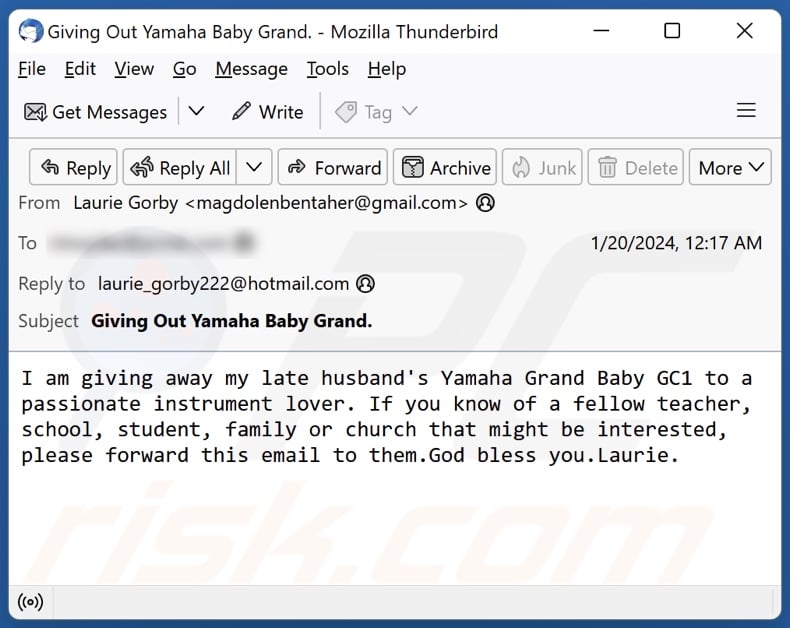
Text presented in this email:
Subject: Giving Out Yamaha Baby Grand.
I am giving away my late husband's Yamaha Grand Baby GC1 to a passionate instrument lover. If you know of a fellow teacher, school, student, family or church that might be interested, please forward this email to them.God bless you.Laurie.
Sample 2:
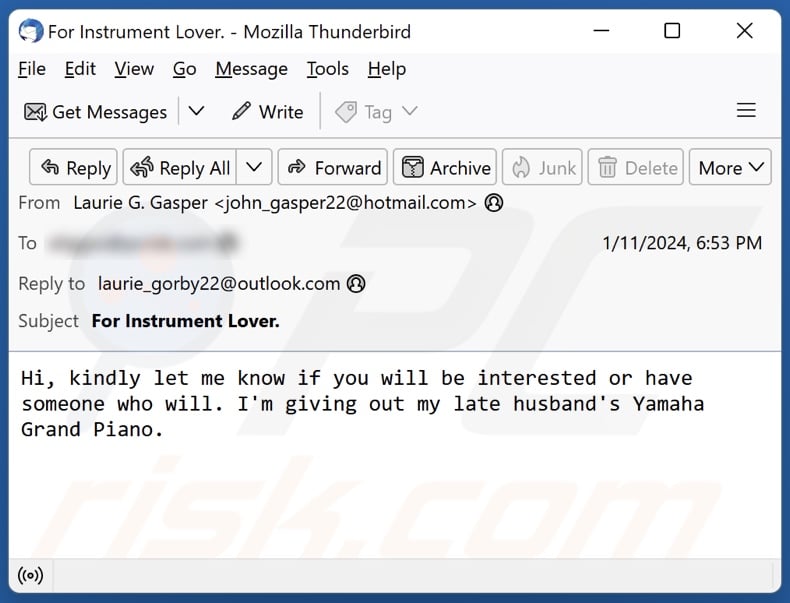
Text presented in this email:
Subject: For Instrument Lover.
Hi, kindly let me know if you will be interested or have someone who will. I'm giving out my late husband's Yamaha Grand Piano.
Sample 3:
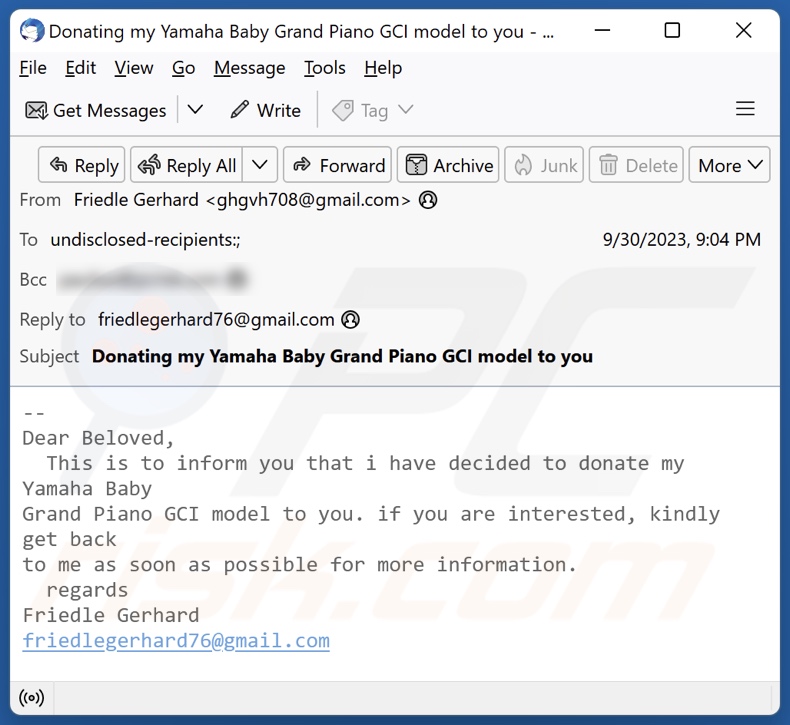
Text presented in this email:
Subject: Donating my Yamaha Baby Grand Piano GCI model to you
Dear Beloved,
This is to inform you that i have decided to donate my Yamaha Baby
Grand Piano GCI model to you. if you are interested, kindly get back
to me as soon as possible for more information.
regards
Friedle Gerhard
friedlegerhard76@gmail.com
Sample 4:
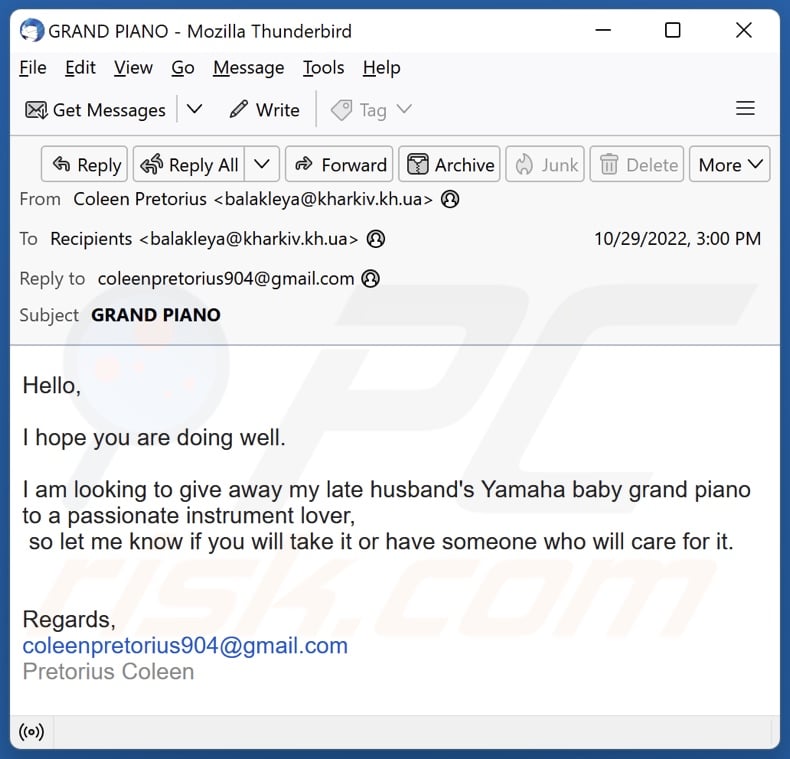
Text presented in this email:
Subject: GRAND PIANO
Hello,
I hope you are doing well.
I am looking to give away my late husband's Yamaha baby grand piano to a passionate instrument lover,
so let me know if you will take it or have someone who will care for it.
Regards,
coleenpretorius904@gmail.com
Pretorius Coleen
Sample 5:
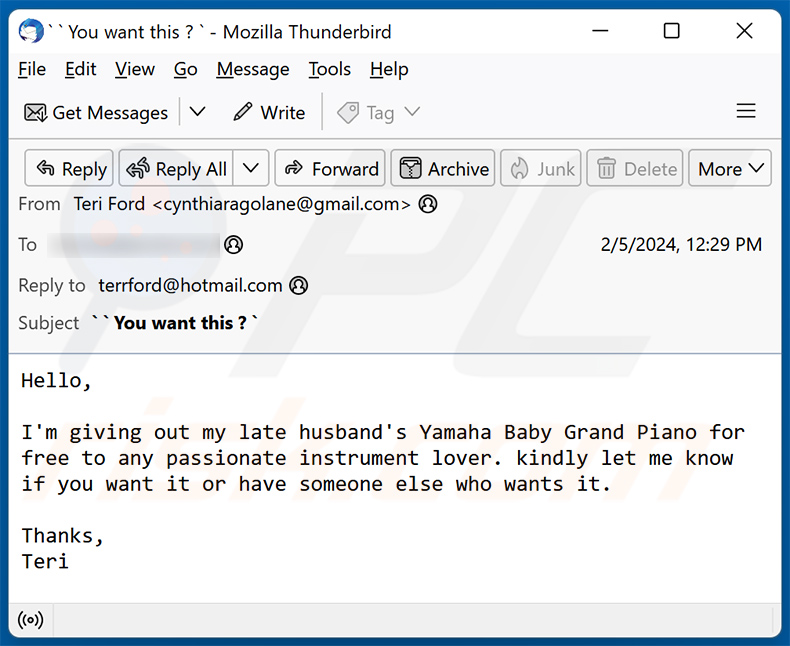
Text presented within:
Subject: ` ` You want this ? `
Hello,
I'm giving out my late husband's Yamaha Baby Grand Piano for free to any passionate instrument lover. kindly let me know if you want it or have someone else who wants it.
Thanks,
Teri
Sample 6:
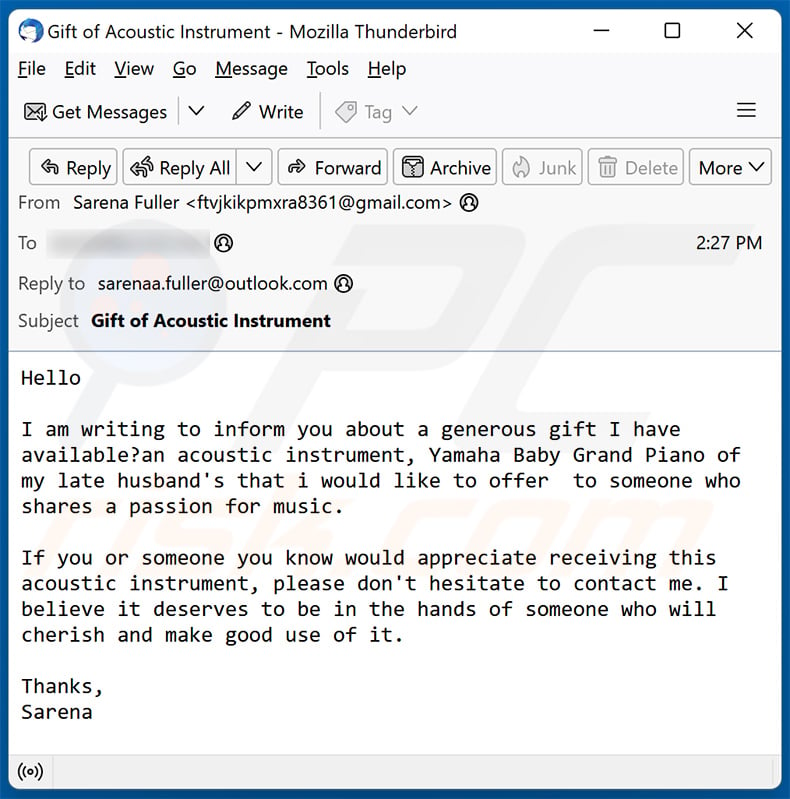
Text presented within:
Subject: Gift of Acoustic Instrument
Hello
I am writing to inform you about a generous gift I have available?an acoustic instrument, Yamaha Baby Grand Piano of my late husband's that i would like to offer to someone who shares a passion for music.
If you or someone you know would appreciate receiving this acoustic instrument, please don't hesitate to contact me. I believe it deserves to be in the hands of someone who will cherish and make good use of it.
Thanks,
Sarena
Sample 7:
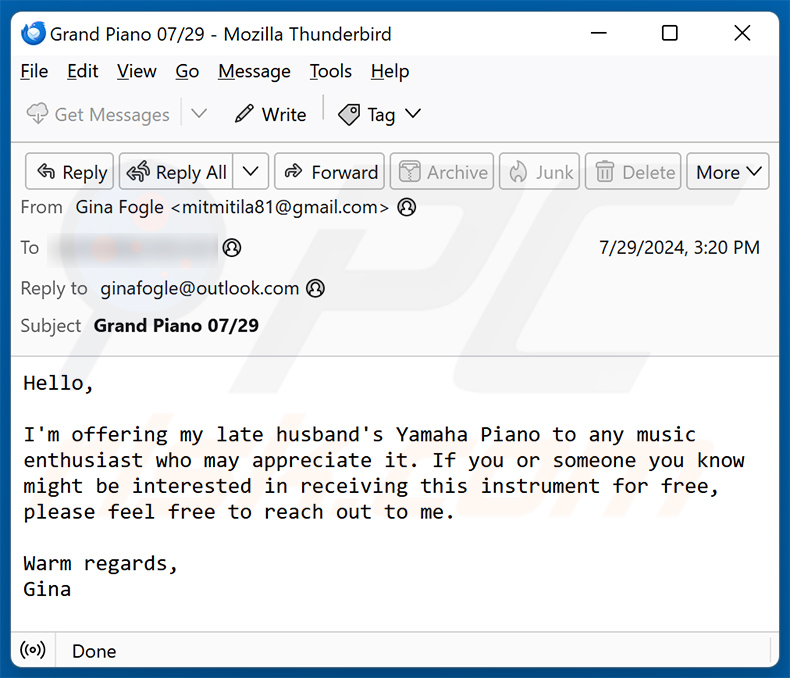
Text presented within:
Subject: Grand Piano 07/29
Hello,I'm offering my late husband's Yamaha Piano to any music enthusiast who may appreciate it. If you or someone you know might be interested in receiving this instrument for free, please feel free to reach out to me.
Warm regards,
Gina
Sample 8:
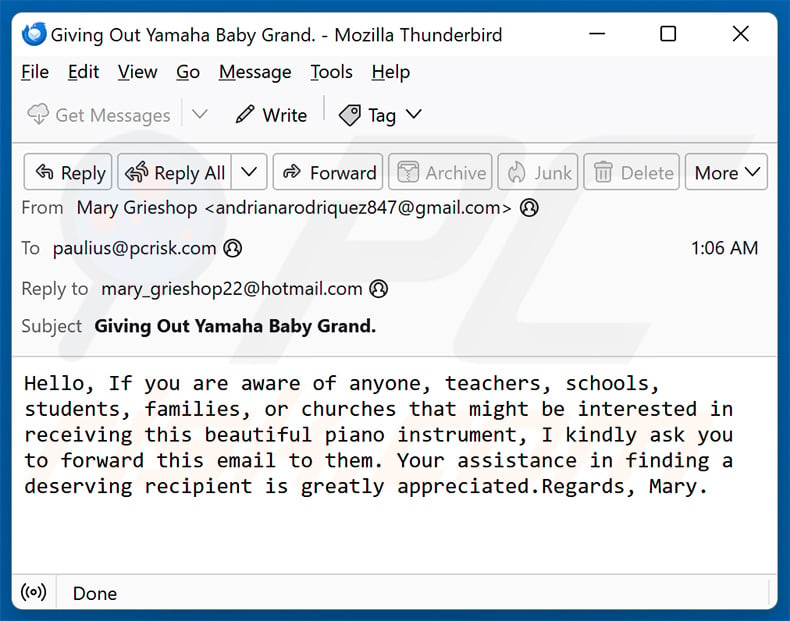
Text presented within:
Subject: Giving Out Yamaha Baby Grand.
Hello, If you are aware of anyone, teachers, schools, students, families, or churches that might be interested in receiving this beautiful piano instrument, I kindly ask you to forward this email to them. Your assistance in finding a deserving recipient is greatly appreciated.Regards, Mary.
Sample 9:
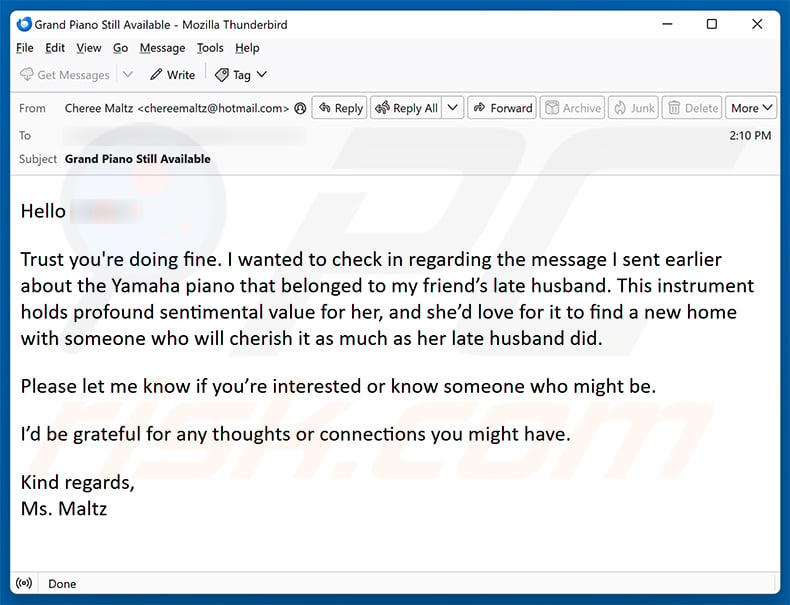
Text presented within:
Subject: Grand Piano Still Available
Hello -,
Trust you're doing fine. I wanted to check in regarding the message I sent earlier about the Yamaha piano that belonged to my friend's late husband. This instrument holds profound sentimental value for her, and she'd love for it to find a new home with someone who will cherish it as much as her late husband did.
Please let me know if you're interested or know someone who might be.
I'd be grateful for any thoughts or connections you might have.
Kind regards,
Ms. Maltz
Instant automatic malware removal:
Manual threat removal might be a lengthy and complicated process that requires advanced IT skills. Combo Cleaner is a professional automatic malware removal tool that is recommended to get rid of malware. Download it by clicking the button below:
DOWNLOAD Combo CleanerBy downloading any software listed on this website you agree to our Privacy Policy and Terms of Use. To use full-featured product, you have to purchase a license for Combo Cleaner. 7 days free trial available. Combo Cleaner is owned and operated by RCS LT, the parent company of PCRisk.com.
Quick menu:
- What is "Yamaha Baby Grand Piano" spam email?
- Types of malicious emails.
- How to spot a malicious email?
- What to do if you fell for an email scam?
Types of malicious emails:
![]() Phishing Emails
Phishing Emails
Most commonly, cybercriminals use deceptive emails to trick Internet users into giving away their sensitive private information, for example, login information for various online services, email accounts, or online banking information.
Such attacks are called phishing. In a phishing attack, cybercriminals usually send an email message with some popular service logo (for example, Microsoft, DHL, Amazon, Netflix), create urgency (wrong shipping address, expired password, etc.), and place a link which they hope their potential victims will click on.
After clicking the link presented in such email message, victims are redirected to a fake website that looks identical or extremely similar to the original one. Victims are then asked to enter their password, credit card details, or some other information that gets stolen by cybercriminals.
![]() Emails with Malicious Attachments
Emails with Malicious Attachments
Another popular attack vector is email spam with malicious attachments that infect users' computers with malware. Malicious attachments usually carry trojans that are capable of stealing passwords, banking information, and other sensitive information.
In such attacks, cybercriminals' main goal is to trick their potential victims into opening an infected email attachment. To achieve this goal, email messages usually talk about recently received invoices, faxes, or voice messages.
If a potential victim falls for the lure and opens the attachment, their computers get infected, and cybercriminals can collect a lot of sensitive information.
While it's a more complicated method to steal personal information (spam filters and antivirus programs usually detect such attempts), if successful, cybercriminals can get a much wider array of data and can collect information for a long period of time.
![]() Sextortion Emails
Sextortion Emails
This is a type of phishing. In this case, users receive an email claiming that a cybercriminal could access the webcam of the potential victim and has a video recording of one's masturbation.
To get rid of the video, victims are asked to pay a ransom (usually using Bitcoin or another cryptocurrency). Nevertheless, all of these claims are false - users who receive such emails should ignore and delete them.
How to spot a malicious email?
While cyber criminals try to make their lure emails look trustworthy, here are some things that you should look for when trying to spot a phishing email:
- Check the sender's ("from") email address: Hover your mouse over the "from" address and check if it's legitimate. For example, if you received an email from Microsoft, be sure to check if the email address is @microsoft.com and not something suspicious like @m1crosoft.com, @microsfot.com, @account-security-noreply.com, etc.
- Check for generic greetings: If the greeting in the email is "Dear user", "Dear @youremail.com", "Dear valued customer", this should raise suspiciousness. Most commonly, companies call you by your name. Lack of this information could signal a phishing attempt.
- Check the links in the email: Hover your mouse over the link presented in the email, if the link that appears seems suspicious, don't click it. For example, if you received an email from Microsoft and the link in the email shows that it will go to firebasestorage.googleapis.com/v0... you shouldn't trust it. It's best not to click any links in the emails but to visit the company website that sent you the email in the first place.
- Don't blindly trust email attachments: Most commonly, legitimate companies will ask you to log in to their website and to view any documents there; if you received an email with an attachment, it's a good idea to scan it with an antivirus application. Infected email attachments are a common attack vector used by cybercriminals.
To minimise the risk of opening phishing and malicious emails we recommend using Combo Cleaner Antivirus for Windows.
Example of a spam email:

What to do if you fell for an email scam?
- If you clicked on a link in a phishing email and entered your password - be sure to change your password as soon as possible. Usually, cybercriminals collect stolen credentials and then sell them to other groups that use them for malicious purposes. If you change your password in a timely manner, there's a chance that criminals won't have enough time to do any damage.
- If you entered your credit card information - contact your bank as soon as possible and explain the situation. There's a good chance that you will need to cancel your compromised credit card and get a new one.
- If you see any signs of identity theft - you should immediately contact the Federal Trade Commission. This institution will collect information about your situation and create a personal recovery plan.
- If you opened a malicious attachment - your computer is probably infected, you should scan it with a reputable antivirus application. For this purpose, we recommend using Combo Cleaner Antivirus for Windows.
- Help other Internet users - report phishing emails to Anti-Phishing Working Group, FBI’s Internet Crime Complaint Center, National Fraud Information Center and U.S. Department of Justice.
Frequently Asked Questions (FAQ)
Why did I receive this email?
Spam emails are not personal. Cyber criminals distribute these letters in massive operations – hence, thousands of users receive identical emails.
I have provided my personal information when tricked by this spam email, what should I do?
If you have disclosed your log-in credentials – immediately change the passwords of all possibly exposed accounts and inform their official support. However, if you've provided other private information (e.g., ID card details, passport scans/photos, credit card numbers, etc.) – contact relevant authorities without delay.
I have read a spam email but didn't open the attachment, is my computer infected?
No, just reading an email is harmless. Systems are infected when malicious attachments or links are opened.
I have downloaded and opened a file attached to a spam email, is my computer infected?
Whether your device was infected might depend on the format of the opened file. If it was an executable (.exe, .run, etc.) – most likely, yes – the system was compromised. However, this might have been avoided if it was a document (.doc, .xls, .pdf, .one, etc.). These formats may require additional actions to start downloading/installing malware (e.g., enabling macro commands, clicking embedded content, etc.).
Will Combo Cleaner remove malware infections present in email attachments?
Yes, Combo Cleaner is capable of detecting and eliminating nearly all known malware infections. Keep in mind that performing a complete system scan is crucial since high-end malicious programs typically hide deep within systems.
Share:

Tomas Meskauskas
Expert security researcher, professional malware analyst
I am passionate about computer security and technology. I have an experience of over 10 years working in various companies related to computer technical issue solving and Internet security. I have been working as an author and editor for pcrisk.com since 2010. Follow me on Twitter and LinkedIn to stay informed about the latest online security threats.
PCrisk security portal is brought by a company RCS LT.
Joined forces of security researchers help educate computer users about the latest online security threats. More information about the company RCS LT.
Our malware removal guides are free. However, if you want to support us you can send us a donation.
DonatePCrisk security portal is brought by a company RCS LT.
Joined forces of security researchers help educate computer users about the latest online security threats. More information about the company RCS LT.
Our malware removal guides are free. However, if you want to support us you can send us a donation.
Donate
▼ Show Discussion